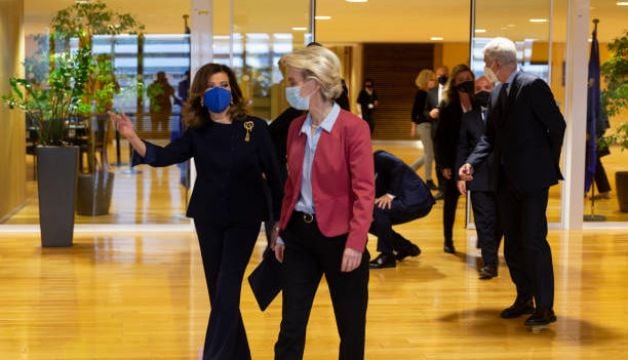Divisions deepened among European Union countries ahead of an emergency meeting of ministers on Tuesday on the bloc's response to a spike in energy prices, with some countries seeking a regulatory overhaul and others firmly opposed.
European gas prices have hit record highs in the autumn and remain at lofty levels, prompting most EU countries to respond with emergency measures like price caps and subsidies to help trim consumer energy bills.
Countries are struggling to agree, however, on a longer-term plan to cushion against fossil-fuel price swings, which Spain, France, the Czech Republic and Greece say warrant a bigger shake-up of the way EU energy markets work.
Those countries will make the case on Tuesday for proposals that include decoupling European electricity and gas prices, joint gas buying among countries and, in the case of a few countries including Poland, delaying planned climate change policies.
"Our proposal today is that options contracts for purchases can be done in a centralised manner by the European Union ... this could be activated in situations when security of supply is at risk," Spain's secretary of state for energy Sara Aagesen said.
In an indication of differences likely to emerge at the meeting, nine countries including Germany - Europe's biggest economy and market for electricity - on Monday said they would not support EU electricity market reforms.
"This will not be a remedy to mitigate the current rising energy prices linked to fossil fuels markets," the nine countries said in a joint statement.
Market structure
The European Commission has asked regulators to analyse the design of Europe's electricity market, but said there was no evidence that a different market structure would have fared better during the recent price jump.
EU energy policy chief Kadri Simson said she hoped to receive a clear message from ministers on what medium-term measures the EU should take to respond.
"We have to start acting right now, despite the fact that the results of those actions will be (seen) in years to come," Simson said.
Other proposals - such as countries forming joint gas reserves - have also been met with resistance from some countries.
"I think that the Spanish government is over-promising by saying joint gas procurement will solve the crisis," Luxembourg energy minister Claude Turmes said.
With less than a week until the international COP26 climate change summit, the energy price spike has also stoked tensions between countries over the EU's green policies, setting up a clash as they prepare to negotiate new proposals including higher tax rates for polluting fuels.
Hungarian prime minister Viktor Orban has dismissed such plans as "utopian fantasy", a stance at odds with other EU countries who say the price jump should trigger a faster switch to low-emission, locally produced renewable energy, to help reduce exposure to imported fossil fuel prices.







